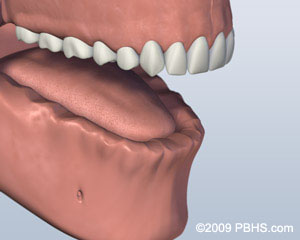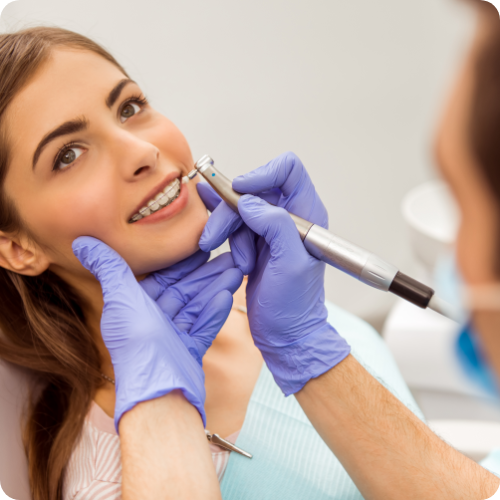It’s not just about protecting the hardware — learning how to care for your dentures can keep your whole mouth healthy. Here are our tips on proper oral hygiene for dentures and some of the best mouthwashes for denture wearers.

Understanding your denture home care instructions
Once fitted with a set of full or partial dentures, you’ll immediately notice an improvement in your smile and jawline. Even though dentures are custom-made for your mouth and are not “real” teeth, it’s still essential to learn how to care for dentures so they last a long time and don’t compromise your oral health.
Food, bacteria, and plaque will stick to your dentures just like your natural teeth. Because of this, it’s important to continue brushing your remaining teeth, gums, and dentures at least twice daily.
Denture Home Care Instructions
Step 1. Dentures can easily crack if you drop them on a hard surface. Before removing your dentures, place a towel on your bathroom or kitchen counter.
Step 2. After removing the dentures, rinse them with warm water and brush them with a soft-bristled brush. Do not use regular toothpaste as it is too abrasive and can leave scratches or result in discoloration.
Step 3. Now you can pull out the regular toothpaste to brush your remaining natural teeth, gums, and tongue. Don’t forget to floss between your remaining teeth. You may also want to rinse with a mouthwash to promote good oral health and prevent bad breath. Some of the best mouthwashes for denture wearers include the Fixodent Gum Care and the Listerine Total Care Anticavity mouthwashes.
Step 4. Before going to sleep, it’s necessary to let your dentures soak in a dentist-recommended soaking solution or room-temperature water overnight. This extended soaking prevents dentures from drying out and becoming brittle. Denture solution is not a highly specialized product — any store brand will work here.
Our Best Tips for How to Care for Your Dentures
While many dental insurers will allow a new set of dentures every five years, with proper care and routine dental checkups, dentures can last seven to ten years. Here are some of our best tips about caring for your dentures and extending their functionality.
- Always rinse your dentures in cold or room-temperature water. They can warp in hot water.
- Never use teeth whitening products on your dentures. This is for the same reason as not using toothpaste — these products are too abrasive. They can cause more damage to your dentures instead of improving their appearance.
- A crucial step in learning how to care for dentures is to inspect them periodically for worn teeth. If the dentures become worn, they will function poorly — and they may make you look older!
- Call your dentist immediately if you ever notice that your dentures are loose. This can cause friction and pressure on the gum tissues and bones, leading to painful complications in your mouth.
- If your dentist recommends using an adhesive as part of your denture home-care instructions, be sure to follow the manufacturer’s instructions and use only the indicated amount.
- Do not sleep in your dentures.
Know When to Call Your Dentist
The best way to learn how to care for dentures is by having regular teeth-cleaning appointments. Schedule these with your dentist every six months. In-between appointments, call your dentist if any of these signs appear:
- Bad breath
- Mouth sores or bleeding gums
- Dentures are feeling uncomfortable
- Dentures appear broken or damaged
- Dentures slip or make noise when you talk or eat
CONTACT DENTAL HEALTH GROUP TODAY
If you’re searching for an experienced, welcoming dentist in the Canoga Park region, contact The Dental Health Group today. We can help you care for your dentures and make them look natural. Call 818-718-2000 with questions or to schedule your appointment.






